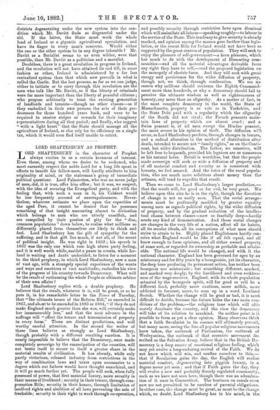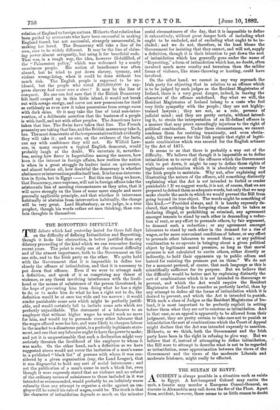• LORD SHAFTESBURY AS PROPHET.
T4011D SHAFTESBURY in the character of Prophet always excites in us a certain keenness of interest. Even those, among whom we desire to be reckoned, who most earnestly respect the noble Lord for a long life spent in efforts to benefit his fellow-men, will hardly attribute to him originality of mind, or the statesman's grasp of immediate political questions. Lord Palmerston, who was no mean judge of men, did, it is true, offer him office ; but it was, we suspect, with the idea of securing the Evangelical party, and with the feeling that, with such a man in it, his Cabinet would be less frequently accused of unscrupulousness. Never- theless, whatever estimate we place upon the capacities of the aged Peer, it cannot be denied that he possesses something of that insight amounting almost to divination which belongs to men who are utterly unselfish, and are compelled by their passion of pity for the "dim, common populations" down below, to realise what millions so differently placed from themselves are likely to think and feel. Lord Shaftesbury has the gift of sympathy for the suffering, and in that gift lies much, if not all, of the secret of political insight. He was right in 1832; his speech in 1867 was the only one which rose high above party feeling, and it is well worth while, amidst a pause in events, while Ire- land is waiting and Arabi undecided, to listen for a moment to the third prophecy, in which Lord Shaftesbury, now a man of vast age, with a strangely special experience of the wants and ways and emotions of vast multitudes, embodies his view of the progress of his country towards Democracy. What will be the result of enthroning the whole People as ultimate arbiter of their own affairs ?
Lord Shaftesbury replies with a double prophecy. He believes that the result, whatever it is, will be great, or as he puts it, in his remarkable letter to the Times of Tuesday, that "the ultimate issues of the Reform Bill," as amended in 1867, and about to be amended in 1883 or 1884, if they do 'pat make England much greater than she was, will, certainly make her immeasurably less," and that the next advance in the suffrage will "affect the tenure and transmission of property in every form." Those are distinct predictions, and well worthy careful attention. In the second the writer of these lines believes as strongly as Lord Shaftesbury, though probably with a different resulting emotion. It is nearly impossible to believe that the Democracy, once made completely sovereign by the emancipation of the counties, will not bestir itself to secure to itself a greater share in the material results of civilisation. It has already, while only partly victorious, released industry from restrictions in the
way of combination laws and -taxes upon necessaries to a
degree which our fathers would have thought anarchical, and it will go much farther yet. The people will seek, when fully possessed of power, that first material luxury, more security in their means of livelihood ; security in their tenure, through com- pensation Bills; security in their homes, through limitation of landlord rights and abolition of all laws preventing the sale of freeholds; security in their right to work through co-operation,
and possibly security through restrictive laws upon dismissal which will assimilate all labour—speaking roughly—to labour in the service of the State. This tendency to give security is already- marked, and opinion among the masses goes farther than legis- lation, or the recent Bills for Ireland would not have been so supported by the great centres of population. They will seek to- enjoy the pleasure of self-government—a keen pleasure, which - has much to do with the development of Dissenting com- munities—and all the material advantages derivable from any right they have to sell,—read the proposed legislation on the monopoly of electric force. And they will seek with great- energy and persistence for the wider diffusion of property, though not, we think, through confiscation. We see no- reason why millions should contemn the Eighth Command- ment more than hundreds, or why a democracy should fail to- perceive the ultimate wisdom as well as righteousness of honesty, any more than an oligarchy. As a matter of fact, in the most complete democracy in the world, the State of Massachusetts, property is as safe as in Yorkshire, and the State Debt paid with a regularity which the oligarchy of the South did not rival ; the French peasants main- tain laws of property which are almost cruel ; and a- Swiss peasant is, of all men except the Hindoo peasant, the most severe in his opinion of theft. The diffusion wilt occur, as Lord Shaftesbury predicts, through changes in tenure,- and a radical alteration in the method of distribution after death, intended to secure not family rights," as on the Conti-. nent, but wider distribution. The father, we conceive, will be left free to bequeath, provided his legatees are as numeroua as his natural heirs. Detail is worthless, but that the people- made sovereign will seek as wide a diffusion of property an& of all material comfort and security as is consistent with honesty, we feel assured. And the votes of the rural popula- tion, who are much more solicitous about money than the artisans, will tend to expedite that result.
Then we come to Lord Shaftesbury's larger prediction — that the result will, for good or for evil, be very great. 'IV& believe upon this also he is in the right, though the direction of change is not so easily seen. That the social arrange- ments must be profoundly modified by greater equality among men as regards political rights, by the wider diffusion of property, and by the gradual reduction of the intellec- tual chasm between classes—now so fearfully deep—hardly needs any kind of demonstration. And those social changes are changes in the very life of a nation, affect all its habits, all its secular ideals, all its conceptions of what men should. strive to attain to be. Highly placed Englishmen hardly con- ceive what England would be like if all felt equal, and all knew enough to form opinions, and all either owned property, of some sort, or regarded its ownership as probable and attain- - able. The national life would be changed, and with it the national character. England has been governed for ages by an aristocracy and for fifty years by a bourgeoisie, yet its character„ the deep tone producing its permanent action, has neither been bourgeois nor aristocratic ; but something different, marked; - and marked very deeply, by the hardihood and even reckless- - ness of the wage-receiver. England, with its whole population actuated by the bourgeois spirit, will for good or evil be a. different land, probably more cautious, more selfish, more addicted to forecast, more, to sum up in a word, Lowland. Scotch. Whether the change will be good or bad, it is most difficult to decide, because the future hides the two main con- ditions of the problem,—the religious tone which will ulti- mately dominate the country, and the view the democracy
will take of its relation to mankind. On neither point is it possible to form as yet a clear opinion. Many observers think that a faith Secularist in its essence will ultimately prevail; but many more, seeing the line all popular religious movements have taken, the outbreak of Puritanism, the outbreak of Wesleyanism, the outbreak of that eccentric movement de- scribed as the Salvation Army, believe that in the British D2- mocracy is a deep sourc3 of emotional religious feeling, which may yet evolve a long-enduring revival of the Faith. We do not know which will win, and confine ourselves to this,— that if Secularism gains the day, the English will realise
material comfort, degenerating into piggish luxury, in a degree never yet seen' and that if Faith gains the day, they will evolve a new and probably fiercely regulated community-,_
such as we have not seen here, though there was an adumbra- tion of it once in Connecticut. The boatmen on canals even now are not permitted to be careless of parental obligations. In either case, the change must be great, as must be the change which, no doubt, Lord Shaftesbury has in his mind, in they
relation of England to foreign nations. Hitherto that relation has been guided by aristocrats who have been successful in making England feared, but not successful, strangely unsuccessful, in making her loved. The Democracy will take a line of its own, sure to be widely different. It may be the line of claim- ing power almost arrogantly, but using it for beneficial ends. That was, in a rough way, the idea, however ill-fulfilled, of the " Palmerston policy," which was welcomed by a nearly unanimous people. His notion of beneficence was often absurd, but he tried to put down slavery, tyranny, and violent wrong-doing, when it could be done without too much risk. The English people is supposed to be un- ideaed, but the people who voted £20,000,000 to sup- press slavery had never seen a slave ! It may be the line of conquest. No one can feel sure that if the British Democracy felt itself cooped up in this little island, it would not break out with savage energy, and carve out new possessions for itself as ruthlessly as even now it takes possessions from savage races with dark skins. Or it may take the line of total non-inter- vention, of a deliberate assertion that the business of a people is with itself, and not with other peoples. The Americans have taken that line. The Swiss have taken that line. The French peasantry are taking that line, and the British masses may take it, too. The most democratic of their representatives think evidently they will take it ; and no one, on the evidence of the facts, can say with confidence they will not. Sir Wilfrid Law- son, in many respects a typical English democrat, would probably laugh at the doubt. We entertain it, neverthe- less, seeing how fierce is Imperialism among the masses, how keen is the interest in foreign affairs, how restless the nation is when in a great struggle its leaders insist on quiescence, and almost before all, how doubtful the democracy is whether abstinence or intervention profits itself best. It is for non-interven- tion in Syria, but in Egypt —? But this one thing we know, that Democracy, once supreme, will not in foreign affairs take the aristocratic line of meeting circumstances as they arise, that it will move strongly on the lines of some more simple and more generally applicable principle, and that whether it intervenes habitually or abstains from intervention habitually, the change will be very great. Lord Shaftesbury, as we judge, is a true prophet, though his words rather set men thinking, than con- tain thoughts in themselves.





































 Previous page
Previous page